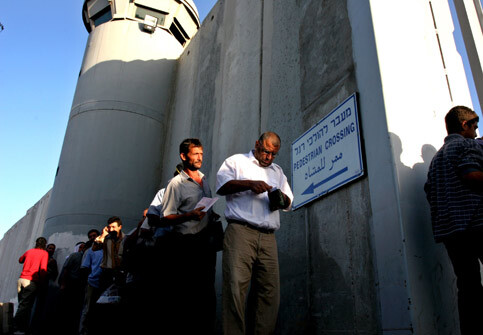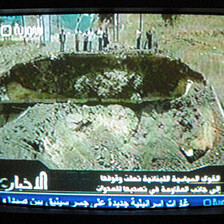Palestine Center 6 December 2006

Not a solution: Palestinians queue next to Israel’s annexation wall as they wait to cross a checkpoint into Jerusalem from Bethlehem, 26 June 2006. (MaanImages/Moti Milrod)
In its 6 December report, The Iraq Study Group made three important points regarding the Israeli-Palestinian conflict: 1) there is no military solution to the conflict; 2) UN Resolutions 242 and 338 and the principle of “land for peace” is the only way to achieve peace; 3) hold unconditional meetings to resume negotiations. The group also stressed the importance of an engaged U.S. administration in political negotiations based on a two-state solution.
While these recommendations are on target and the significance of the messenger should not be dismissed, the message is not new. Palestinians have long reiterated these points.
Palestinians have constantly pointed out that Israel’s military approach to the conflict is not the solution and any so-called military success-such as a cease-fire-is only temporary if it is void of a credible political process. The group points out that “the vast majority of the Israeli body politic is tired of being a nation perpetually at war,” but it should also be said that Palestinians are tired of being perpetually under occupation.
When the Palestinians agreed to peace talks with Israel in the early 1990s, it was based on a “land for peace” formula outlined in UN Resolutions 242 and 338 which addressed lands occupied in 1967. That compromise, recognizing Israel on 78 percent of historic Palestine, was justified with the belief that the international community would make sure that Palestinians would be left to enjoy a state of their own on 22 percent of their homeland and it would be a state in which they would fulfill and exercise the rights they had long been denied as an occupied people.
However, years of Israeli facts on the ground, such as the expansion of Jewish settlements, Jewish only bypass roads, the separation Wall in the West Bank and the almost complete isolation of East Jerusalem, and most importantly, Israel’s military approach toward Palestinians, has replaced the “land for peace” formula with a “peace for peace” strategy. To some, as evident from the large number of Palestinian civilian deaths documented by international human rights organizations, it seems Israel has adopted a “land for life” policy toward Palestinians.
For Palestinians, the urgency for the resumption of negotiations is a matter of having something to negotiate, mainly the issues which The Iraq Study Group points out-Jerusalem, borders and settlements — which are fast disappearing off the table.
Just as the group’s recommendations regarding Iraq will face challenges from ideologists, so will its recommendations regarding the Israeli-Palestinian conflict. However, the encouraging sign is in the messenger and the power of the bi-partisan messenger to influence US policy in the Middle East.
A change of course is needed in both Iraq and toward the Palestinians. A change in strategy on both fronts will serve first and foremost U.S. interests and those of the region.
Samar Assad is the Executive Director of The Palestine Center.
Related Links



